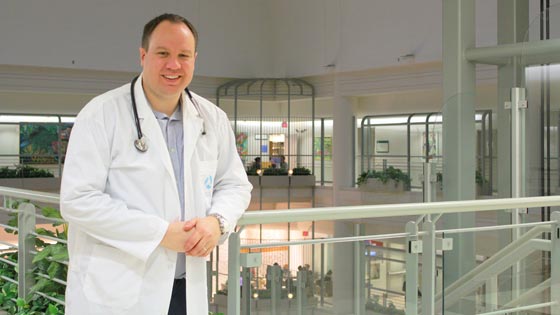
Dr. Philippe Bedard is a Staff Medical Oncologist in the Division of Medical Oncology& Hematology and the Fellowship Director for the Robert & Maggie Bras and Family New Drug Development Program at the Princess Margaret Cancer Centre. (Photo: UHN)
As a Medical Oncologist at the Princess Margaret Cancer Centre, Dr. Philippe Bedard sees approximately 300 new patient referrals per year. Access to comprehensive patient information helps him provide the right care.
This was made apparent when one patient's information from ConnectingGTA, Central Ontario's electronic health record, changed the course of the patient's cancer treatment.
"Having access to a patient's complete medical history helps me make better decisions," said Dr. Bedard. "When I don't have this information, it can limit and slow down the care I provide."
A database to aid patient care
In Fall 2015, Dr. Bedard saw a patient in his clinic. The patient had been diagnosed with cancer but there was insufficient information to determine the cancer's primary site. While difficult to determine; if the primary site can be identified, then specific chemotherapy or targeted drugs can be administered to stop or slow the growth of cancer cells.
Having used ConnectingGTA previously for similarly complex patients, Dr. Bedard reviewed his new patient's health information. He noticed a lab result, from a different organization, that was markedly abnormal.
The patient's alpha-fetoprotein (AFP) levels, identified with a type of blood test, were very high. This hint along with the patient's clinical presentation and prior test results lead to a reclassification of the patient's primary site of disease as the liver.
Bringing together many healthcare providers
Patients in central Ontario often visit multiple healthcare organizations to receive care. Prior to ConnectingGTA, this information was fragmented, dispersed in paper format or across multiple electronic systems.
Quick facts:
- ConnectingGTA went live in August 2015
- To date over 1,400 clinicians and staff have used ConnectingGTA
- On average it is accessed 1,125 times a week
- The system:
- Curbs duplication of lab and imaging tests
- Cuts down un unnecessary CCAC referrals
- Reduces the number of phone calls and faxes to other hospitals
Patients were also often forgetting or could not recall all their test results from different organizations.
ConnectingGTA addresses this challenge. It provides real-time access to discharge summaries, lab and imaging results, and other essential patient information from hospitals, Community Care Access Centres (CCAC) and labs. It allows for seamless and secure access to patient records from over 40 organizations.
"ConnectingGTA changed the entire course of disease management for this patient. It can help clinicians understand the full picture," said Dr. Bedard. "I spend less time calling other hospitals or asking administrative staff to fax requests for other records. This way, I can spend more time providing care to my patients."
Clinicians aren't the only ones who benefit from ConnectingGTA. Patients and their families are also directly affected by usage of the regional health record.
ConnectingGTA is a major step forward in advancing the provincial EHR. Not only is it an amazing tool for clinicians because it provides access to critical information, but ConnectingGTA also delivers peace of mind to patients and their families. They no longer have to remember every detail of their medical history. All that information is available in one place: ConnectingGTA.
ConnectingGTA is available to all clinicians and staff who provide care for or assist in the care of UHN patients. It is launched through the "Regional EHR" tab in the patient's EPR chart.
